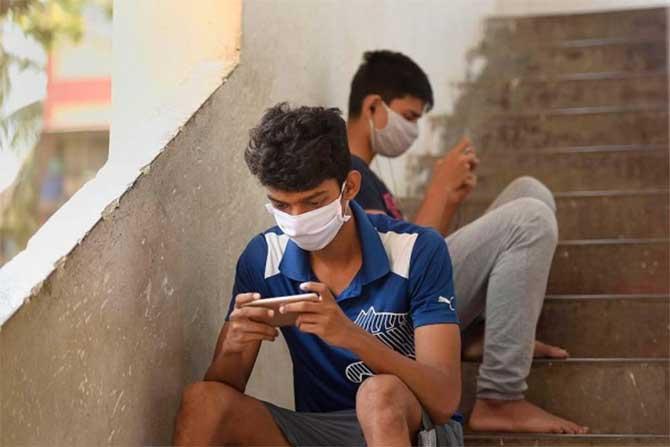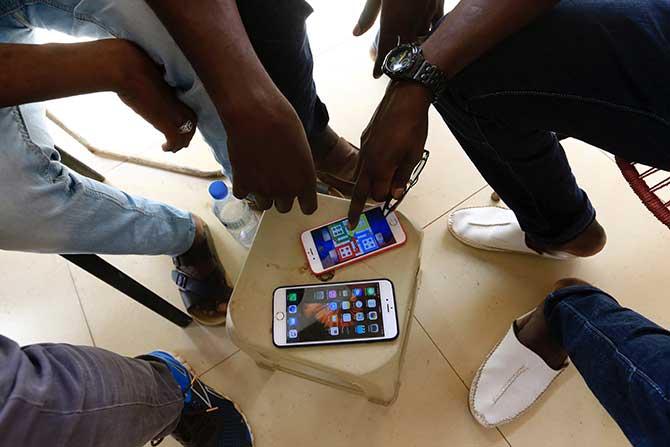The obvious reason for this growth: A booming smartphone user base coupled with the availability of dirt-cheap data, observes Dhruv Munjal.

In October 2015, when Vikash Jaiswal expressed a keen interest in developing a phone game based on Ludo, his team -- comprising only a programmer and a designer -- at Mumbai's Gametion Technologies told him that the idea would not work.
For one, the game seemed outdated, a relic from an antiquated gaming era.
It got worse: His programmer had never even played Ludo.
But Jaiswal had a hunch: If they managed to get this right, he was certain that the game would become one of the top 10 most-downloaded games in India.
"While conceptualising it, I realised that Ludo involved both strategy and luck, a unique combination. It was unlike carrom or chess, which were driven purely by skill," says Jaiswal.
So he tweaked a few rules, quickened the game up, simplified the user interface and came up with Ludo King.
Since going live in February 2016, the game, with over 350 million installs on the Google Play Store, has become the most downloaded gaming app in the country.
No Indian game before this had even touched the 100 million mark.
And these numbers have only grown -- astronomically, at that -- during the coronavirus-induced lockdown.
From 12 million to 13 million daily active users till two months ago, Ludo King's everyday engagement has shot up to 51 million in the past few weeks.
"During the first phase of lockdown, we realised that the traffic to our app went up post the telecast of Ramayan on Doordarshan. So we had to increase the number of servers to deal with the extra demand," says Jaiswal.

Figures for mobile gaming apps and platforms, in fact, have been witnessing a huge surge everywhere.
Loco, the live streaming and esports app, saw a 20 per cent jump in users in March and April.
Similarly, EWar Games, another gaming platform, has already accumulated over 500,000 users since starting out only four months ago.
The response has been even more emphatic for card games such as rummy, with Adda52 claiming that new registrations have gone up by 100 per cent.
Even as the current crisis has undoubtedly presented the gaming industry with a tremendous opportunity to expand its footprint, this is a revolution that, experts feel, has been in the making for a while.
India ranks fifth among the world's top mobile gaming markets, with an estimated 220 million users spending an average of 42 minutes every day to binge on their favourite games.
Nasscom data says India will have 628 million gamers by the end of 2020, a figure Jaiswal reckons might eventually prove to be significantly higher given the rapid addition of new players in the last two months.
Further, the mobile gaming industry is projected to be worth $1.1 billion by the end of the year.
The obvious reason for this growth is a burgeoning smartphone user base, coupled with the availability of dirt-cheap data.
But there are other factors as well: The drastic transformation of India's digital infrastructure as well as improvements in the quality of the games on offer.
"Games were earlier distributed through consoles or PCs, which was an expensive and low-penetration model," says Anirudh Pandita, founder at Pocket Aces, the digital entertainment company behind Loco.
Another possible explanation is the social engagement that mobile gaming permits, giving platforms a chance at engaging and retaining players, which was difficult to pull off with gaming in its previous avatar.
"Most games today come with a very strong social element," says Pandita, adding that games were earlier like movies -- high-fixed cost, low retention -- but now that is changing.

The wildly popular PUBG, or PlayerUnknown's Battlegrounds, is a perfect example of what Pandita is talking about: A frenetically paced game with exhilarating end-to-end action that allows players to interact with each other in real time, a feature that wasn't possible with first-person shooting games from the past.
Others like FreeFire offer something similar.
Sensing that people now have more time to spare, platforms have ramped up capacity and added new tournaments, even attracting users from the metros (a large chunk of mobile gaming traffic usually comes from the smaller cities).
"An important point here is that Indians have always been enthusiastic about absorbing new technology," says EWar Games Founder Parth Chadha.
"There are 50,000 games being played on our platform every day."
Even as the likes of PUBG retain their enormous popularity among a large section of gamers, much of mobile gaming is being driven by more casual games like Ludo and real-money apps -- or "transactional online skill" games -- such as rummy and poker.
Also making a considerable dent are fantasy sports and quizzing games.

"Games like rummy are designed in such a way that you can enjoy them even if you're not tech-savvy," feels Vinit Godara, CEO and co-founder at MyTeam11, a fantasy sports platform that recently launched its own version of the game -- a 13-card format.
Moreover, he points to a new fascination with traditional games like rummy and Ludo, perhaps because older audiences find them more relatable.
"In a nutshell, localised gaming options have become the pulse of the market," says Godara.
MyTeamRummy is off to a good start, hosting 25,000 to 30,000 users every day, while MyTeam11Quiz has a solid base of 350,000 participants.
"These games don't need a lot of ability, so you don't end up spending too much energy. Plus, some of them are freakishly addictive," says Shweta Tyagi, a 42-year-old stay-at-home mother in Delhi.
With hundreds of games in the market and players constantly switching from one platform to another, companies are slowly moving towards greater diversification.
In addition to live-streaming titles like PUBG, Call of Duty and FIFA, Loco also houses free offerings that include carrom and pool.
EWar does the same.
"Gaming is all about community, so it helps having everybody in one place. Plus, it's good for user retention," says Chadha.
The Mobile Premier League (MPL), among the biggest online gaming platforms in India, has been able to offset the potential loss of user engagement due to the lack of live sporting action by adding new titles to its already substantial portfolio.
While fantasy sports continue to be a vital component of MPL's operations, in February, it partnered with Nextwave Multimedia to bring the popular World Cricket Championship title to its platform.
Last month, it launched Rogue Heist, India's first indigenous shooter game.
"We have more than 40 games on MPL. The churn from fantasy sports has been more than made up for by the fast growth of casual games," says Abhishek Madhavan, vice-president, growth and marketing, MPL.

The introduction of real-money games as well as platforms choosing to enlarge offerings has made it possible for some in the industry to generate steady revenue streams.
Once dependent only on advertising and in-app purchases, real-money apps now generally take a 10 to 20 per cent cut from the stakes in play.
Investors, sensing the potential, have bought in.
MPL is backed by Sequoia Capital, Go Ventures and Times Internet.
Dream11, one of the early movers in the fantasy sports category, has raised funds from Tencent, Kalaari Capital and Think Investments in the past.
The first unicorn of its kind, news reports in February suggested it was headed for a whopping valuation of $2.25 billion.
On a slightly smaller level, at Ludo King, Jaiswal is expecting a five-time increase in turnover from FY19, which was pegged at $6 million.
"Gone are the days when transactional skill games suffered from a perception problem. The gaming ecosystem has really evolved, and it will only get better," says Roland Landers, CEO of the All India Gaming Federation, a not-for-profit that promotes self-regulation among industry stakeholders through its 'Skill Games Charter'.
The key word, of course, is 'skill'.
Gambling is a state subject in India, and while most states allow skill-based games, the ones reliant on chance are prohibited under law.
Needless to say, gambling laws in our country are vague and subject to different interpretations.
"In an ever-expanding segment that is fully online, it is sometimes difficult to keep track. But we hope to replicate South Korea's self-regulation model, which involves people from the industry working with regulators appointed by the government," adds Landers.

Another issue may yet appear in the form of data.
As apps collect more information and dissect player behaviour, they may soon be able to design offers and incentives accordingly, possibly luring users into sticking with a particular game for longer than usual.
Having said that, the maturing of the gaming ecosystem has benefited all those involved in the space.
Even as players proficient at PUBG earn big bucks through live streaming -- serious gamers have now made entire careers out of it -- lucrative opportunities have also opened up for developers.
Advanced technologies like augmented and virtual reality have played a major role in differentiating gaming products, and this has reflected favourably in the expansion of our client profile, explains Prafulla Mathur, co-founder at Queppelin Technologies, which has developed platforms for companies like Gullyy Play, among others.
Naturally, the larger question is: Can this purple patch last?
Akshat Rathee, founder and managing director at esports company NODWIN Gaming, is confident that mobile gaming can even challenge the OTT (over-the-top) platforms in the visual entertainment stakes.
"Gaming is not like flicking a switch and just sitting down and watching something. You are the participant and controlling everything, so it's way more interactive," he says.
He also isn't worried about the potential cancelling of physical esports events, where fiercely competitive pro-gamers fight it out with rapt spectators looking on, due to the prevailing health crisis.
"It's a bit like the conundrum surrounding the IPL: Should we play it behind closed doors, or not play it all," feels Rathee.
"In my opinion, we should go ahead with it because most of the revenue for the IPL comes in from media rights. The same applies to major gaming events."
In May, NODWIN opened registrations for ESL India Premiership 2020, one of India's largest gaming tournaments, which will be streamed exclusively on Disney+ Hotstar.
It will feature four games: PUBG Mobile, FIFA20, Clash of Clans and Counter-Strike: Global Offensive.
Pandita says: "The numbers that have gone up in the last few months may normalise in the near future, but this is just the beginning of the gaming revolution in India. Hyper-casual and fantasy games have been successful, but now you'll see hardcore and mid-core gaming on mobile take off in a big way as well."
Production: Ashish Narsale/Rediff.com













 © 2025
© 2025